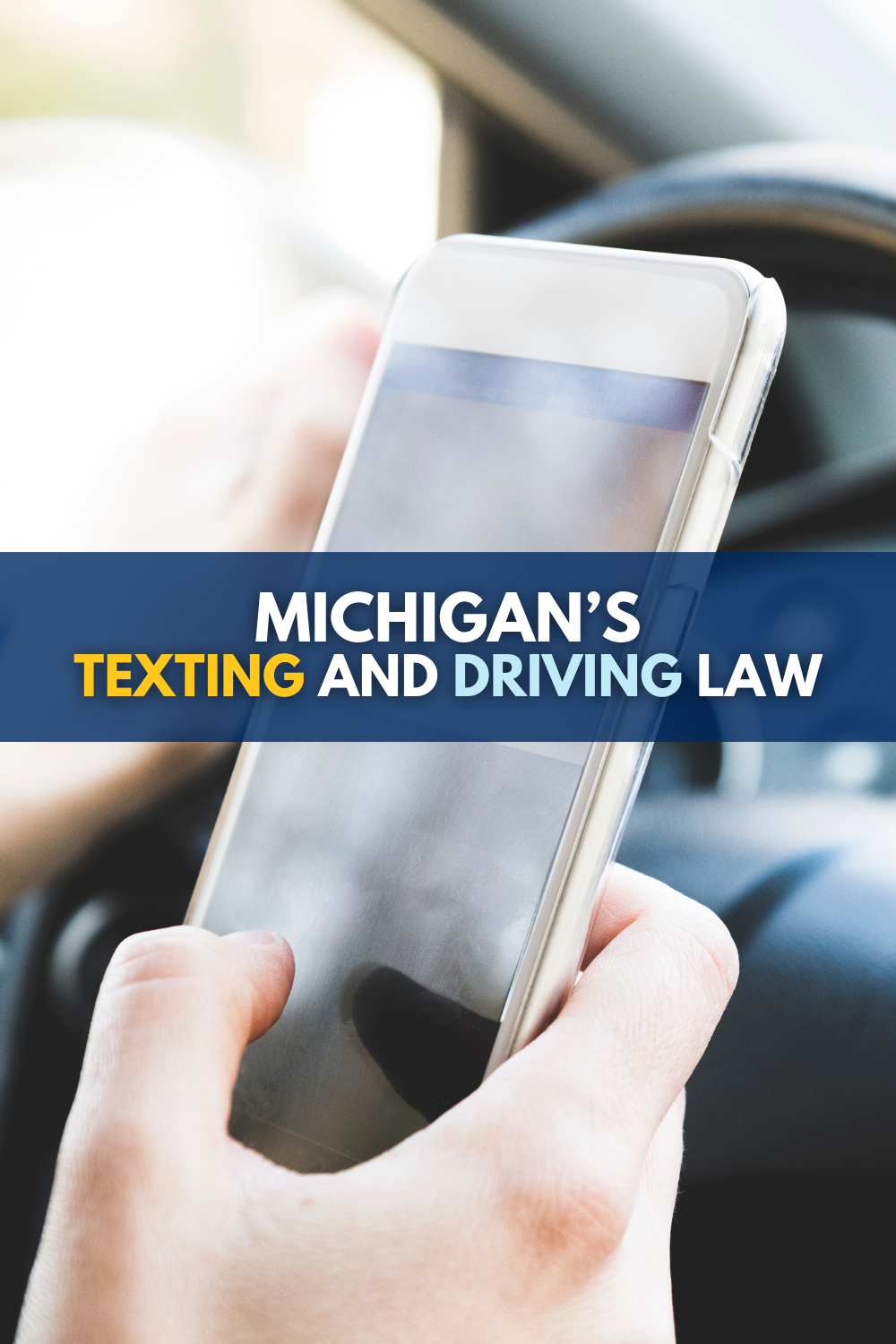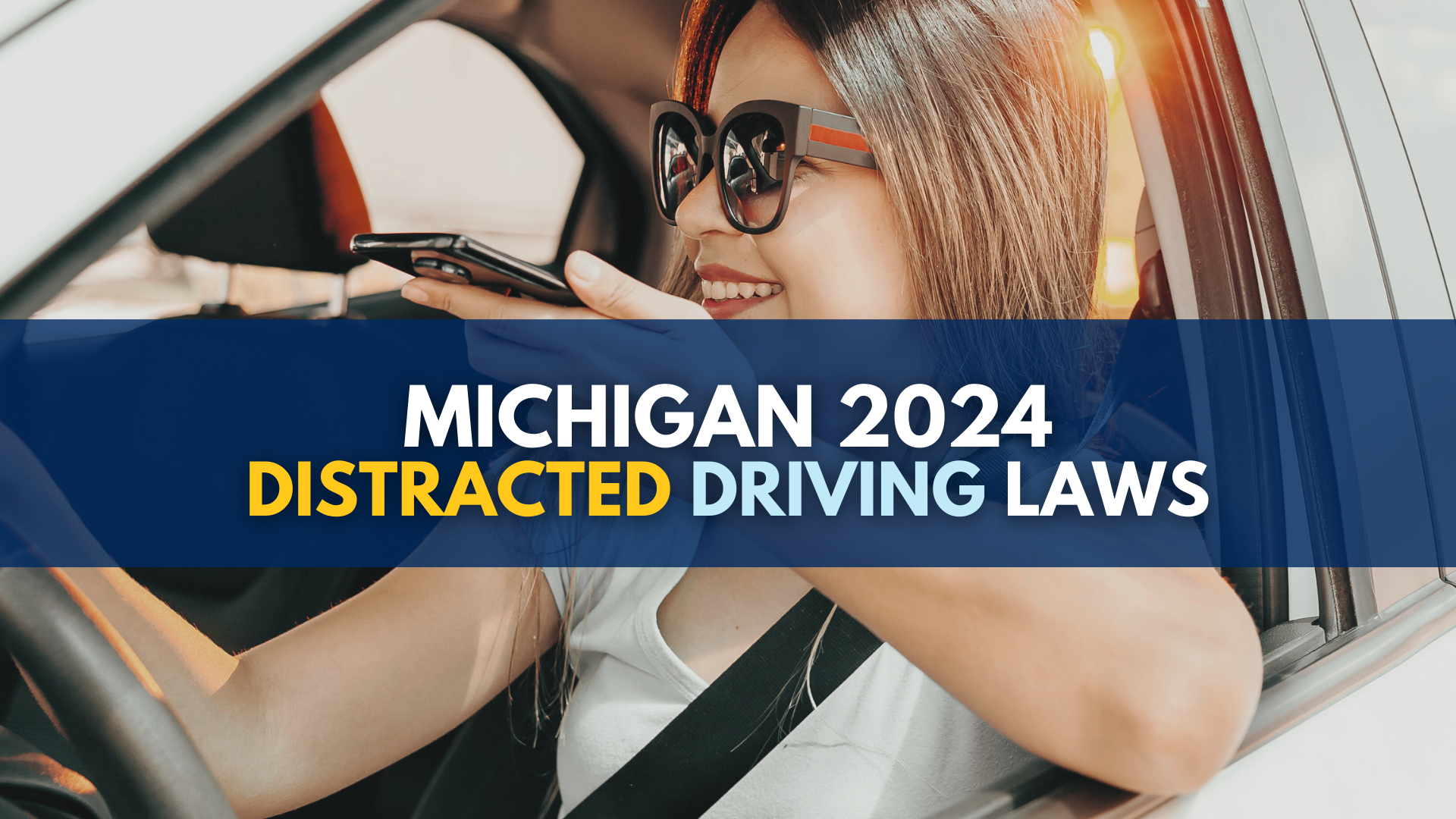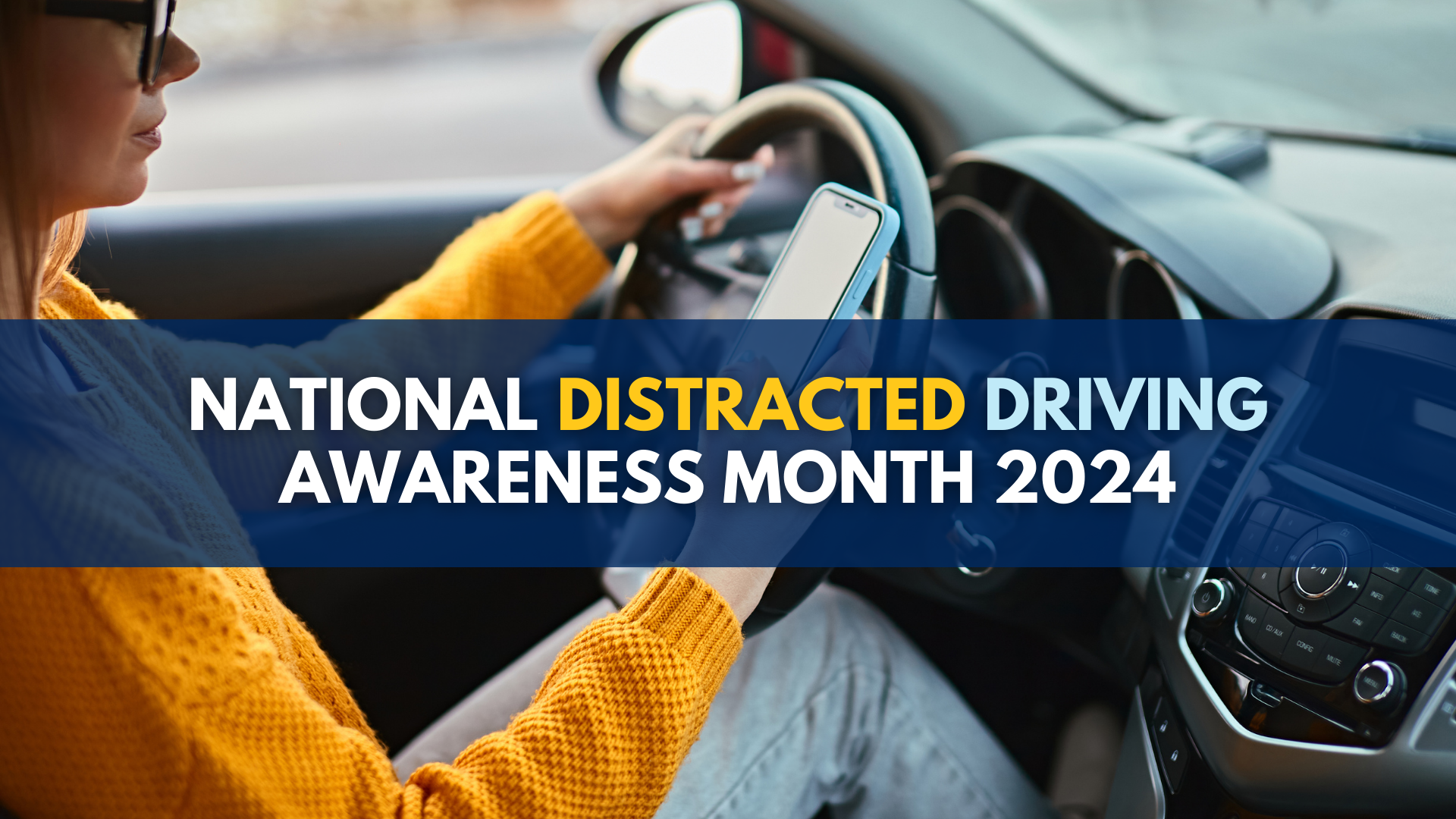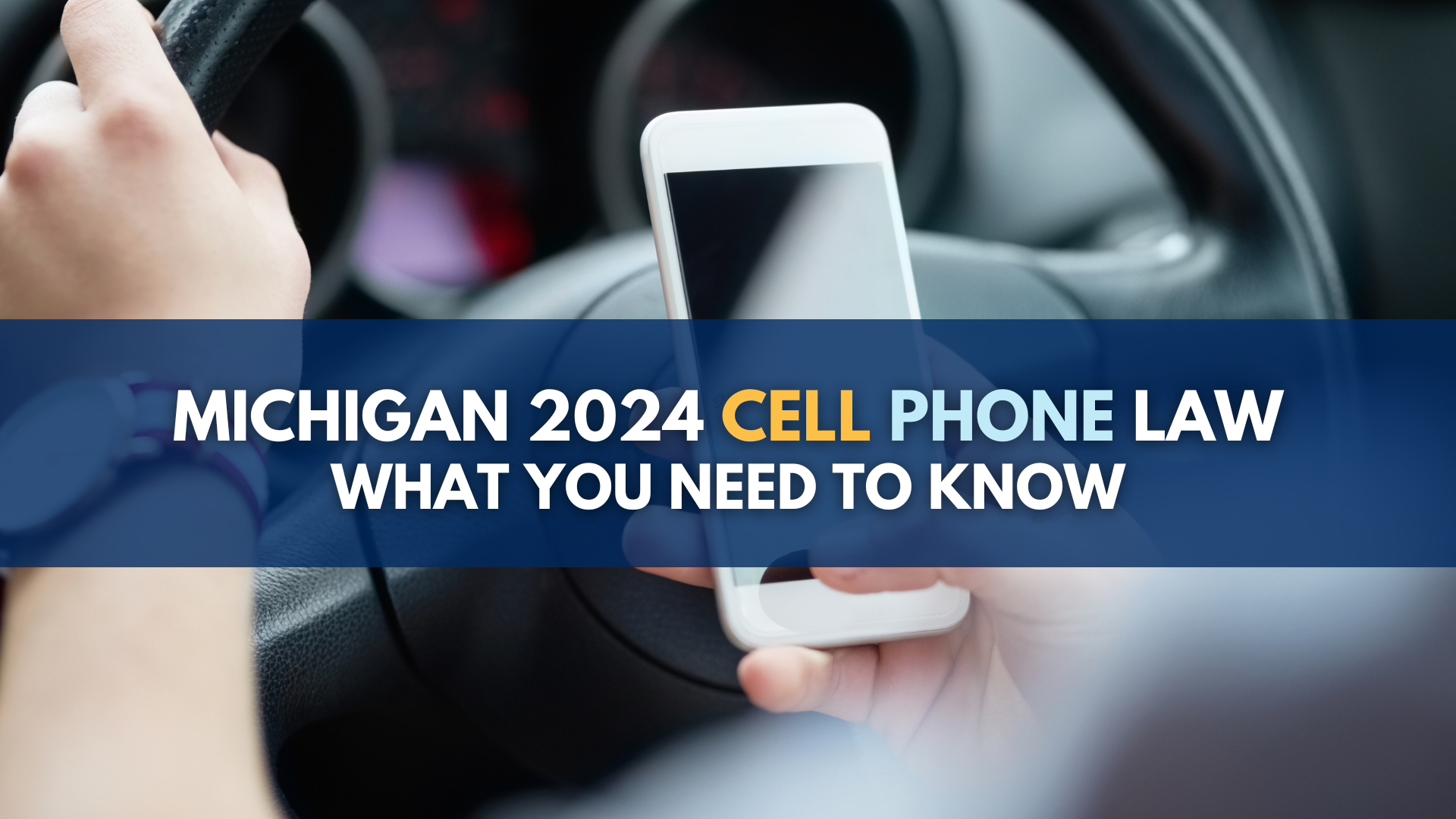The Michigan texting and driving law is intended to stop drivers from using a hand-held cell phone or mobile electronic device to text, make calls, watch videos, or go on social media while they’re behind the wheel.
Penalties include fines, community service, driving school and points on their license.
The law does allow drivers to use their phones in “hands-free” mode.
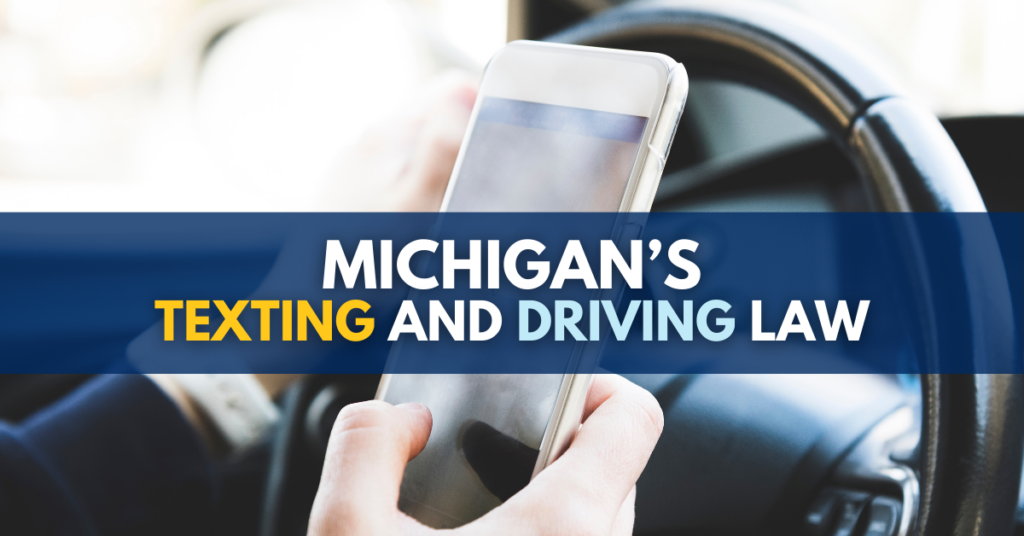
As a car accident attorney, I see the dangerous, texting and driving trend reflected in my own cases. Texting and distracted driving are now the biggest single cause for most of the automobile accident cases that I handle.
It’s no wonder.
Drivers who are texting are 23 times more likely to be involved in a crash, according to the Virginia Tech Transportation Institute.
Below I will discuss Michigan’s texting and driving laws in more detail. I believe reducing the number of distracted driving accidents that occur is the most important first step we can take today toward making our roads safer. To that end, I proudly serve as the current Chair of the American Association for Justice Distracted Driving Litigation Group. I also speak regularly to lawyers at legal seminars and to high school students and parents throughout Michigan about the dangers of distracted driving.
To learn more, please check out this video of my presentation at Berkley High School in Berkley, Michigan:
What is the texting and driving law in Michigan?
The Michigan texting and driving law prohibits all drivers from using a hand-held cell phone or mobile electronic device to send, receive or read a text message while driving on Michigan roadways. (MCL 257.602b(1), (2) and (13))
It also prohibits drivers from using a hand-held cell phone or mobile electronic device to talk on the phone, watch videos and/or go on social media. (MCL 257.602b(1), (2) and (13))
What does the Michigan texting and driving law say about hands-free texting?
The statutory language of the Michigan texting and driving laws does not prohibit drivers from texting while driving if the cell phone or device they’re using is in “hands-free” or “voice-operated” mode or is “placed in a mount.” (MCL 257.602b(3)(d) and (f))
What are the penalties for violating the Michigan texting and driving law?
The penalties for violation of the Michigan texting and driving law may include: (1) a fine of $100 to $250; (2) 16-24 hours of community service; (3) driving school for 3 or more texting-while-driving violations in a 3-year period; and (4) repeat offenders get points on their driving records.
Here are more details about the penalties under the law:
- A $100 fine for a first violation and/or 16 hours of community service. (MCL 257.602b(4)(a))
- A $250 fine for a second or subsequent violation and/or 24 hours of community service. (MCL 257.602b(4)(b))
- Drivers with 3 or more texting violations within a 3-year period must complete a “basic driver improvement course” (MCL 257.602b(8))
- 1 point for second texting-while-driving violation of MCL 257.602b. (MCL 257.320a(1)(y))
- 2 points for third or subsequent texting-while-driving violation of MCL 257.602b. (MCL 257.320a(1)(x))
Unfortunately, these “penalties” for violating law are unjustifiably lenient and wildly disproportionate to the very real dangers that texting drivers pose to everyone else on our roads.
Texting drivers are 23x more likely to cause a car accident than non-texting drivers.
Plus, the science shows that texting drivers can be more dangerous and a bigger threat to people on the road than drunk drivers.
Is violation of these laws considered a “primary” offense?
A police officer can treat a violation of the Michigan texting and driving law as “the primary or sole reason” to stop and issue a citation to a texting driver. (MCL 257.602b(9))
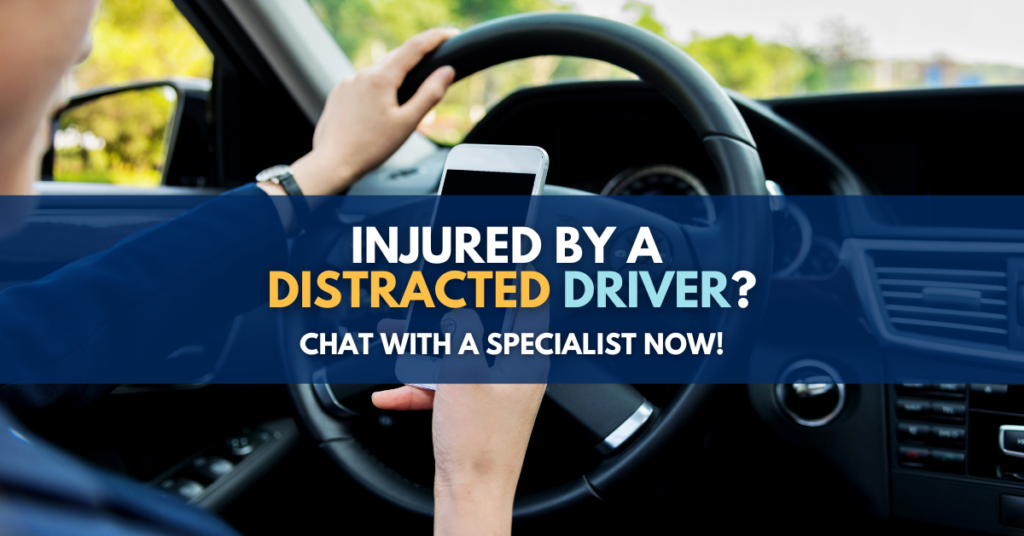
Can a texting driver be sued for causing a crash after violating the laws?
If a driver violates the texting laws and causes a car accident resulting in injury or death, then he or she can be sued for pain and suffering compensation, economic damage, or wrongful death damages.
If the driver is not also the vehicle’s owner, then the owner may also be sued for injuries resulting from a violation of the law under Michigan’s “owner liability” law. The owner of a motor vehicle is liable for any injuries or deaths caused by the negligent operation of his or her vehicle. (MCL 257.401(1))
In some cases, the business that employed the driver or another individual can also be sued and added to a car accident lawsuit under the theory of respondeat superior or remote texter liability.
Does the law address remote texter liability?
The Michigan texting and driving laws do not address remote texter liability, which is the legal concept that if you text a person whom you know is driving and will likely answer your text even if driving, then you may be held legally liable if the person causes a crash resulting in injury or death.
Remote texter liability is something that everyone should take seriously, but it should especially become a top priority for businesses that regularly communicate via text with delivery drivers and employees who drive as part of their job.
As I told the Detroit Free Press when they interviewed me about the potential impact of remote texter liability on businesses:
“If you text your employees while they’re behind the wheel [and they’re “likely to read and reply to your text messages”], you could be sued on the theory of ‘remote texter liability’ if the employee whom you’re texting gets in a car crash and injures or kills someone else.”
To learn more, check out this video:
What are the penalties if your violation of the Michigan texting and driving laws results in a crash?
If a driver violates the Michigan texting and driving laws and causes a crash, he or she faces penalties such as: (1) a criminal conviction; (2) possible jail time; (3) fines; and (4) points on the driver’s license. The penalties will depend on whether the crash resulted in death, injury or property damage.
Specifically, the law provides the following penalties depending on the type of crash:
- A texting driver who causes “the death of another person” is guilty of a misdemeanor and could be sent to jail for a year and/or ordered to pay a fine of $2,000. (MCL 257.601d(1))
- A texting driver who causes “serious impairment of a body function to another person” is guilty of a misdemeanor and could be sent to jail for up to 93 day and/or ordered to pay a fine of $500. (MCL 257.601d(2))
- A texting driver who causes “an at-fault collision with another vehicle, a person, or any other object” will get “4 points” on his or her driver’s license. (MCL 257.320a(1)(l))
- A driver who violates the law and is at-fault for causing a crash is subject to double the fines that would normally be imposed for the violation. (MCL 257.602b(6))
Were you injured by someone who violated the these specific laws? Call Michigan Auto Law first
If you have suffered a personal injury in a car accident caused by someone who violated the Michigan texting and driving law and you would like to speak with an experienced attorney, you can call us toll free anytime 24/7 at (855) 781-7747 for a free consultation with one of our car accident attorneys. We will answer your questions about your legal rights to pain and suffering compensation, economic damages, auto No-Fault insurance PIP benefits, and settlements in cases like yours. There is absolutely no cost or obligation. You can also get help from an experienced auto accident attorney by visiting our contact page or by using the chat feature on our website. Steven Gursten is the current President of the American Association for Justice Distracted Driving Litigation Group. He lectures and teaches auto accident attorneys throughout the nation on what distracted driving is and on how to obtain evidence of distracted driving in their own cases. Steve has spoken at national webinars on the subject of distracted driving evidence and discovery. Also, Steve speaks to high school students and parent groups throughout Michigan as part of Joel Feldman’s End Distracted Driving Campaign school and parent presentations.
